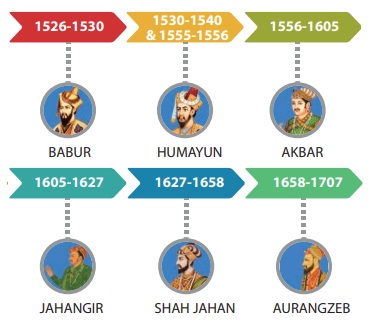The Mughal Empire | Term 2 Unit 2 | History | 7th Social Science - Summary, Glossary | 7th Social Science : History : Term 2 Unit 2 : The Mughal Empire
Chapter: 7th Social Science : History : Term 2 Unit 2 : The Mughal Empire
Summary, Glossary
Summary
ŌĆó
Babur founded the Mughal Empire in 1526 after defeating Ibrahim Lodi in the Battle
of Panipat (1526). HumayunŌĆÖs unsettled conditions and Sher ShahŌĆÖs victory over him
in the Battle of Kanauj; Sher ShahŌĆÖs efficient land revenue administration; and
the introduction of coin system and standardised weights and measures are dealt
with in this chapter.

ŌĆó HumayunŌĆÖs retrieval of the Mughal Empire and
his untimely death leading to the accession of his son Akbar, with Bairamkhan as
the regent, and defeating Hemu, the great general of Sur dynasty, in the Battle
of Panipat (1556) are described.
ŌĆó
AkbarŌĆÖs military conquests as well as his religious policy are explained.
ŌĆó
JahangirŌĆÖs disinterest in state governance leading to dominance of his wife Nur
Jahan in the Mughal Court is elaborated upon.
ŌĆó
Shahjahan extending Mughal rule in the Deccan and the resultant conflict with Marathas
are analysed.
ŌĆó
AurangzebŌĆÖs conquests helped to expand the Mughal Empire, but his policies against
Rajputs, Marathas and Sikhs provoked resistance from them, paving the way for its
downfall.
ŌĆó
Mughal administration headed by the Emperor, who in turn was assisted by various
officials, is described. AkbarŌĆÖs Mansabdari system and the land revenue policy formulated
by Raja Todar Mal according to the zabt system are examined.
ŌĆó
MughalsŌĆÖ contributions to culture, notably to art and architecture, are highlighted.
Glossary
1.
expedition: a journey undertaken
with the purpose of war Ó«¬Ó»ŗÓ«░Ó»ŹÓ«»Ó«ŻÓ««Ó»Ź
2. prolonged: lengthy
Ó«©Ó»ĆÓ«ŻÓ»ŹÓ«¤
3. subdued: conquered
Ó«ģÓ«¤Ó«¤Ó«ĢÓ»ŹÓ«ĢÓ»üÓ«żÓ«▓Ó»Ź
4. rebellious: showing
a desire to resist authority Ó«ĢÓ«▓Ó«ĢÓ«ĢÓ»ŹÓ«ĢÓ«ŠÓ«░
5. bestowed: awarded
Ó««Ó«żÓ«┐Ó«¬Ó»ŹÓ«│Ó«┐Ó«żÓ»ŹÓ«▓Ó»Ź
6. hereditary: inheritance
of a title, office, or right Ó«¬Ó«ŠÓ«░Ó««Ó»ŹÓ«¬Ó«░Ó«┐Ó«»
7. Enduring: lasting
over a period of time Ó«©Ó»ĆÓ«¤Ó«┐Ó«żÓ»Ź / Ó«©Ó»ĆÓ«¤Ó«┐Ó«żÓ»Ź Ó«ĢÓ«ŠÓ«▓Ó««Ó»Ź
References
1.
Satish Chandra, History of Medieval India 800-1700, Orient Blackswan, New Delhi,
2007.
2
.J.L. Mehta, Advanced Study in the history of Medieval India: Mughal Empire, Vol.
II, 1526-1707, Sterling Publishers, 2011.
3.
Harbans Mukhia, The Mughals of India, Blackwell Publishing, New Delhi, 2009.
4.
Abraham Eraly, The Emperors of Peacock Throne, Penguin, 2007.
Related Topics